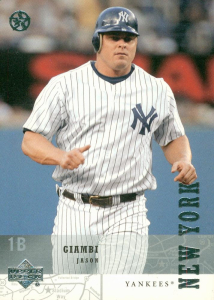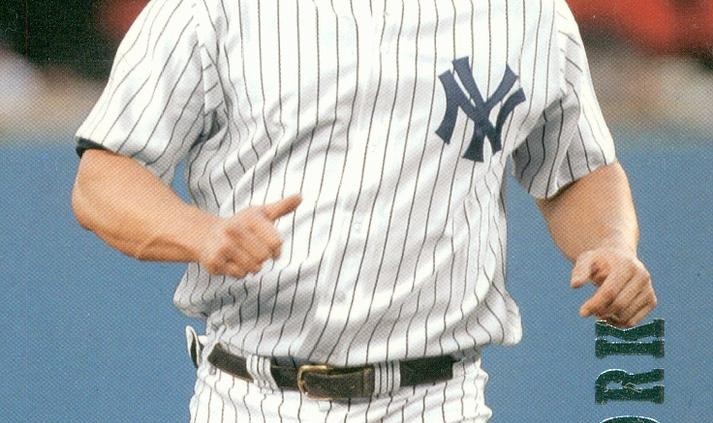May 17, 2002: Giambi’s game-ending grand slam gives Yankees 14-inning win over Twins
 With rain falling and the clock approaching 1:00 A.M., Yankees coach Don Zimmer wasn’t even sure of the situation any more. He turned to Roger Clemens on the bench and asked, “If Giambi hits it out, do we win?”1
With rain falling and the clock approaching 1:00 A.M., Yankees coach Don Zimmer wasn’t even sure of the situation any more. He turned to Roger Clemens on the bench and asked, “If Giambi hits it out, do we win?”1
Such was the setting on a soggy Friday night-cum-Saturday morning in a back-and-forth game at Yankee Stadium. The Minnesota Twins had a 12-9 lead over the New York Yankees in the 14th inning as Jason Giambi came up with the bases loaded and one out.
The Twins were the darling team of baseball. Presumed to be one of the teams targeted for contraction after the 2001 season, the Twins were leading their division in 2002, not only surviving but thriving under new manager Ron Gardenhire.2
Beyond how much of a threat contraction really was, the Twins had started their comeback in the standings the year before. After eight straight losing seasons, Minnesota started strong in 2001 and held a five-game lead at the All-Star break. Even though they faded in the final months, the Twins still finished second by six games to Cleveland. The Indians were in a cost-cutting mode and lost some key players, including Roberto Alomar in a trade and Juan González to free agency, during the offseason. The Twins leading the pack in the Central Division wasn’t as much of a miracle as some wanted to make it out to be.
However, it was still a splashier story than the Yankees, who had come within a half-inning of their fourth straight championship in 2001 and were 26-15 coming into a weekend series at home against the Twins.
For the series opener, New York went with Mike Mussina, who had dominated the Twins going back to his years in Baltimore. Against Minnesota, Mussina had an 18-2 career won-lost record with a 2.61 earned-run average. The Yankees staked him to a lead as Bernie Williams homered into the upper deck in right off right-hander Rick Reed in the bottom of the first.
But the Twins started the second with three hits, a double by Bobby Kielty, a bunt single by Jay Canizaro, and a run-scoring single by A.J. Pierzynski. Denny Hocking brought in Canizaro with the go-ahead run on a groundout, and Jacque Jones singled in Pierzynski for a 3-1 lead.
It lasted until the fourth inning. Jorge Posada started it by reaching base on an error by Reed, and Robin Ventura tied the score with a long home run to center. Singles by John Vander Wal and Rondell White continued the rally. After Nick Johnson struck out, Alfonso Soriano hit a long drive to left. Jones ran back, leaped, and momentarily had the ball in his glove before it popped out and dropped beyond the fence. Official scorer Bill Shannon said he thought about calling a four-base error on Jones. “I looked at it on replay very carefully,” he said, but Shannon finally ruled it a three-run homer.3
Another home run, by Posada with Giambi aboard, in the fifth gave the Yankees an 8-3 lead, seemingly an insurmountable one for the Twins against a longtime nemesis. However, Mussina did not retire another batter.
Brian Buchanan opened the sixth with a pop fly to left. Miscommunication by shortstop Derek Jeter and left fielder Rondell White allowed the ball to drop for a double. More solid hits – singles by Kielty and Canizaro followed by a Pierzynski double – cut the lead to 8-5 and chased Mussina. Hocking greeted Mike Stanton with a single and Jones made the score even closer with a single to score Pierzynski. Cristian Guzman sacrificed the runners to third and second and, after an intentional walk to Torii Hunter, David Ortiz delivered a game-tying sacrifice fly. Ramiro Mendoza came in and tried to stop the carnage, but Buchanan came through with his second hit of the inning, a single to drive in Jones and put the Twins ahead, 9-8.
The lead held into the last of the ninth. Mike Jackson, who had struck out Soriano to end the eighth, stayed on to retire Jeter leading off the ninth. Gardenhire summoned Eddie Guardado – who was 14 for 14 in save opportunities – to finish it off, but Bernie Williams had other ideas. Batting right-handed this time, he drilled a homer to left to tie the score.
The Twins went down quietly against Steve Karsay and Mariano Rivera the next three innings, and the Yankees threatened but didn’t score. With one out in the 13th, Giambi singled, and it looked as though the game might end when Posada blasted a drive over Hunter’s head in center. Giambi was waved home but was nailed at the plate by Hocking’s relay. The Yankees loaded the bases but White lined out to Jones, giving New York nine runners left on base over the last four innings.
Minnesota broke through in the 14th, starting with a walk by Casey Blake off Sterling Hitchcock. Buchanan beat out an infield single to third with Blake going to third on an overthrow by Enrique Wilson. Kielty singled Blake home. After a fielder’s choice and fly out, Hocking and Jones singled to score Kielty and then Canizaro.
Mike Trombley was charged with finishing it off, but he allowed a single to Shane Spencer to open the bottom of the inning. After Soriano flied out, Jeter singled and Williams walked, bringing up Giambi. As the rain fell harder, Clemens answered his coach’s question regarding Giambi hitting it out. “Yeah, Zim, that counts as four and we won’t have to worry about the rain.”4
Trombley’s first pitch was a fastball on the outer part of the plate, just not far enough out. Giambi turned on the pitch and drove it into the right-center-field bleachers for a 13-12 win. As the Yankees mobbed Giambi and John Sterling yelled, “Yankees win . . . Thaaaa Yankees win,” the remaining fans – still many of them remaining from the nearly 40,000 who attended – were serenaded by Frank Sinatra’s “New York, New York.”5 The time of game was 5 hours, 45 minutes.
The homer was Giambi’s fourth hit of the game; Buchanan and Kielty had four hits for the Twins.
Giambi was in his first season with the Yankees, hitting well enough but still concerned about fitting in with the New York fans. With his grand slam, Giambi had earned his pinstripes.6
The Twins and Yankees both made the playoffs in 2002. Minnesota won its opening playoff round, against Oakland, and fell in the League Championship Series to the Anaheim Angels, the team that had beaten New York in the opening round.
As of 2022, the Yankees have made it to two World Series – winning one of them – since then, although this doesn’t meet the standards of the Yankees of the twentieth century.
While the Twins continued winning division titles over the next eight years, their frustration has been worse, especially with the Yankees. In Ron Gardenhire’s tenure with the Twins, his team went 26-64 in the regular season against the Yankees, 28-76 including the postseason. The New York dominance continued; through 2022, the Yankees were 98-38 and 114-40 including playoff games.
Sources
In addition to the sources cited in the Notes, the author consulted Baseball-Reference.com and Retrosheet.org.
https://www.retrosheet.org/boxesetc/2002/B05170NYA2002.htm
https://www.baseball-reference.com/boxes/NYA/NYA200205170.shtml
Notes
1 Lisa Olson, “Yank Lore Gets to Grow Even More,” New York Daily News, May 19, 2002: 58-59.
2 The Montreal Expos were the other team that were thought subject to contraction.
3 Bob Herzog, “What a Blast,” Newsday (Long Island, New York), May 19, 2002: C3.
4 Olson.
5 Video of grand slam: https://www.youtube.com/watch?v=cQrVrAZSQaY.
6 Giambi’s game-ending grand slam with his team down by three runs was only the second to occur at Yankee Stadium. The other was by Babe Ruth on September 24, 1925.
Additional Stats
New York Yankees 13
Minnesota Twins 12
14 innings
Yankee Stadium
New York, NY
Box Score + PBP:
Corrections? Additions?
If you can help us improve this game story, contact us.


